Rachel Tropea is Senior Research Archivist at the University of Melbourne and and attended PASIG2019 with support from the DPC's Leadership Programme which is generously funded by DPC Supporters
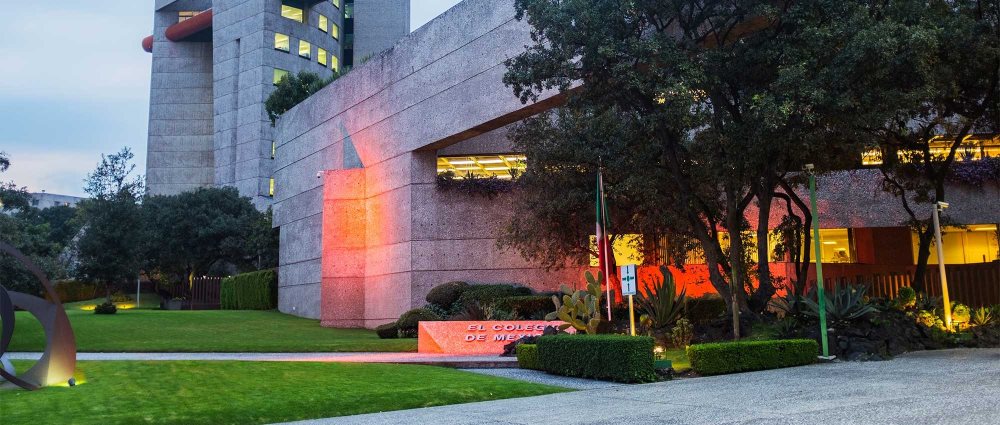
Photo sourced from El Colegio de México, A.C. Available at https://www.colmex.mx/assets/slider/slide-folleto_original_16.jpg?1508794010 [accessed 9 March 2019].
This is my first of two blog posts about PASIG2019 held at El Colegio de México (pictured above) in Mexico City. Here I focus on the history and organisation of Preservation and Archiving Special Interest Group Meeting (PASIG), and in my next post I delve into the content of some of the presentations. With the list of conferences growing seemingly exponentially, PASIG is a stand out for people working in digital preservation and archives.
It’s worth going back to the beginning of the story of PASIG to understand what makes it such a unique and gratifying experience for participants. PASIG was the brainchild of Art Pasquinelli and Mike Kellar at Stanford, both of whom were looking to share knowledge and experiences, good and bad, with others working in the burgeoning field of digital preservation. According to Art “we wanted something that was very practically oriented”[i]. Ideas soon turned into action, and the first PASIG was held in 2007, with experts from Oxford University, LOCKSS, and the French and British national libraries in attendance among others.
Compared to other conferences, PASIG is intimate. There is a deliberate strategy by the organisers to bring in at least 50% newcomers every year and keep the size of the gathering small. This year there were 150 attendees (compare this to the 1800 people on the PASIG mailing list) and well over half of them were newcomers. Most of the attendees were from Universities, but there were also standalone libraries and archives, as well as vendors. The conference location typically alternates between a North American and a European venue which reflects the demography of the core membership group. This year’s choice of Mexico City opened up the conference to people from South America. Consequently, the organisers chose to have a bilingual conference and to provide simultaneous translation (English-Spanish, Spanish-English) throughout the event.
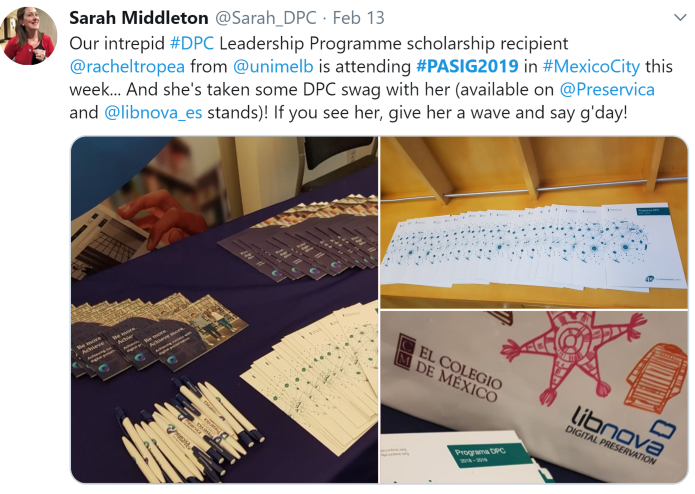
Values of openness, honesty, collegiality, cooperation, and pragmatism flow throughout this meeting, and are evident in the content, governance and in the community that has grown around PASIG.
PASIG is run by a steering committee and a program committee who aim to keep things informal. For example, instead of a call for papers a group sets the ‘agenda skeleton’, which then gets advertised a few months before the meeting. People are invited to contribute their ideas and to ‘flesh out’ the agenda, and there is a lot of room allocated for lightening rounds.
This community driven approach extends to the structure of the conference. This year’s opening presentation was an ‘Introduction to Digital Preservation’ which had the effect of making newcomers like me feel valued and welcome, of managing expectations and of situating the audience on common ground. The emphasis on inclusivity was a winner with participants who gave that presentation one of the highest ratings in their feedback. In fact, feedback from participants helps to shape and evolve the meetings every year.

PASIG2019 ran over three days, with pre and post-conference workshops at either end. There was plenty of socializing too and eating delicious food at beautiful venues – the reception at Cineteca Nacional was a great night. The organisers are intent on making the conference as accessible as possible. Registration for the event is very low in cost (generally US$150), and this year an even lower price was offered to South Americans. The reception, dinner and workshops are free to attend, so there are no additional costs.
I have a particular interest in community building and training, so I was drawn to talks addressing those themes. Having said that, it was rare that a talk didn’t incorporate those subjects. Infrastructure, storage architectures (open source and commercial) and the economics or costs associated with those, and workflows are recurrent topics at PASIG, and accompanying illustrative case studies are popular.

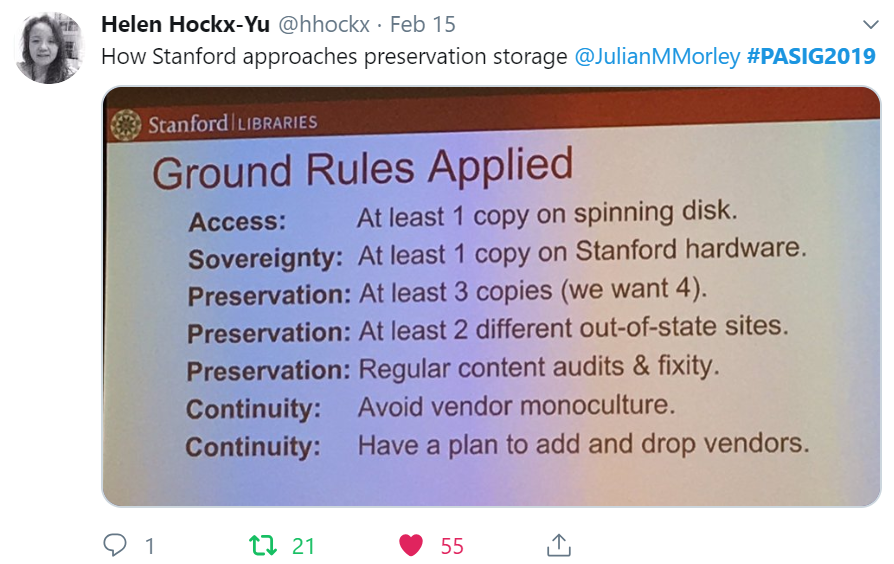
Presentation highlights for me included (and this was really hard to narrow down):
- Keynote: Carlos Martínez Suárez, Video Trópico Sur
- Tools and Resources to Do Self-Assessment: Amy Rudersdorf (AVP), Ben Fino Radin (Small Data Industries), Digital Preservation AssessmentFrances Harrell (NEDCC)
- Training and Education Opportunities: Frances Harrell (NEDCC) and Alexandra Chassanoff (Educopia)
- Community Archives: Nancy Godoy (Arizona State University), Veronica Reyes-Escudero (University of Arizona)
- Distributed Digital Preservation Discussion: Courtney Mumma (Texas Digital Library), Grant Hurley (University of Toronto), Heather Klein (Duraspace). This included a talk by Mary Molinaro about the disbanding of the Digital Preservation Network (DPN)
- Featured Talk, “Social Media Data Preservation in an API-driven World”: Amelia Acker (University of Texas at Austin)
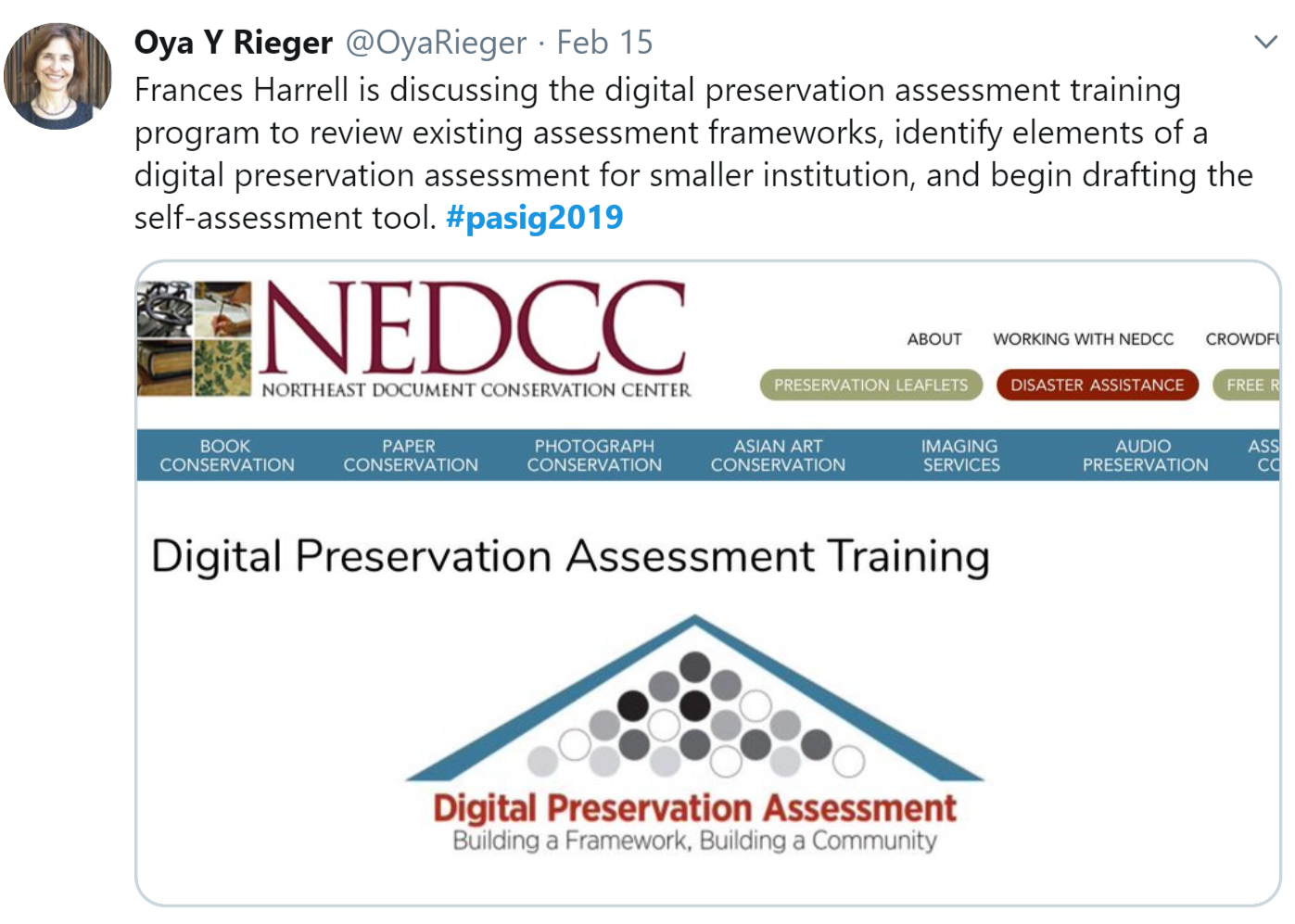
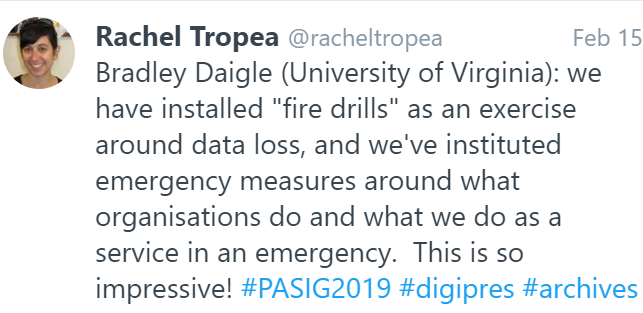
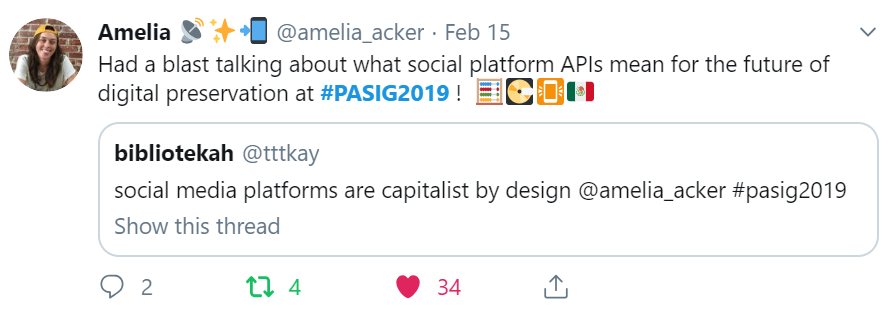
The persistent themes have been summed up nicely by Oya Y. Rieger in her blogpost about the event:

These are comforting words. If I had to summarise in my own words perhaps it would be that be that digital preservation is an ongoing conversation.
For more about PASIG including blogs, slide presentations and the official conference website see RESOURCES below.
I am so very grateful to the Digital Preservation Coalition (DPC) for supporting my trip to the conference through the Leadership Programme scholarship scheme. Thanks also to the wonderful hosts at El Colegio de México and Art Pasquinelli for his kindness and hospitality.
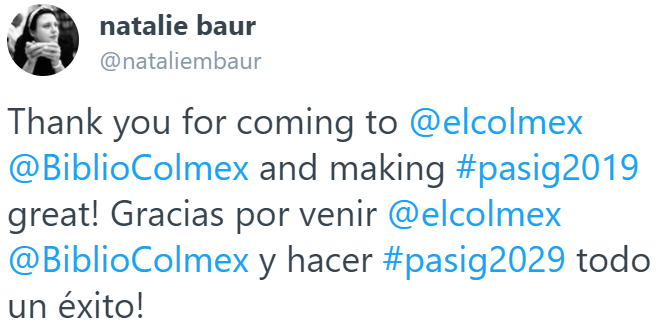
RESOURCES
[Accessed March 2019]
Websites:
- The PASIG2019 conference website has background information, code of conduct, the program etc., see http://pasig2019.colmex.mx/
- PASIG main website includes the mail list and details of past conferences. Available at https://preservationandarchivingsig.org
Conference slide presentations:
- The slide presentations are available on the PASIG2019 website via figshare, see https://preservationandarchivingsig.org/
Blog posts:
- Oya Y Rieger: “Reflections on PASIG: Advancing digital preservation through community cultivation”, Ithaka S+R. Available at https://sr.ithaka.org/blog/reflections-on-pasig/
- Mark Evans: Recap of PASIG”, History Associates Inc. Available at https://www.historyassociates.com/resources/blog/pasig-2019-1/
- Kelly Bolding: ‘PASIG (Preservation and Archiving Special Interest Group) 2019 Recap’, Bloggers. Available at: https://saaers.wordpress.com/2019/03/19/pasig-preservation-and-archiving-special-interest-group-2019-recap/
Twitter:
- There was a lot of twitter activity, so for details and photos see #PASIG2019
Recorded meetings (reflections of the organisers):
I love these recordings of very open and honest reviews of PASIG2019. They are so great for so many reasons (reflections of the attendees, their openness and varied backgrounds, and the fact that the recordings exist and are publicly available)
- Steering Committee Review Meeting [Zoom]: Featuring Arthur Pasquinelli, Thib Guicherd-Callin and Julian Morley from Stanford. Arthur, Thib and Julien give their impressions of the conference, and Thib and Julien give abridged versions of their talks on ‘LOCKKS RE-Architecture and Collaboration Opportunities’ and ‘Storage Cost Modeling’ respectively. Available at https://stanford.zoom.us/recording/play/LnO45WOw4VxLyAUfWY7iPls8SOGdV05t4LpoMryUu_1iYSbfqM1E2BIeoc2jd-vy?continueMode=true
- NDSA Infrastructure Interest Group conference call: This group is closely aligned with PASIG, many members are also on the PASIG steering committee. In this recording, David Minor, UCSD (member of PASIG steering committee), Courtney Mumma, Texas Digital Library (member of PASIG steering committee), Oya Rieger, Ithaka S+R and Cornell University, and Arthur Pasquinelli review history of PASIG, and PASIG 2019 - key presentations, important points made, and their impressions from the conference. Available at https://www.youtube.com/watch?v=0qTYOftUb2E&feature=youtu.be
[i] Review of February 2019 PASIG Meeting, available at https://stanford.zoom.us/recording/play/LnO45WOw4VxLyAUfWY7iPls8SOGdV05t4LpoMryUu_1iYSbfqM1E2BIeoc2jd-vy?continueMode=true [accessed 9 March 2019].






































































































































Comments